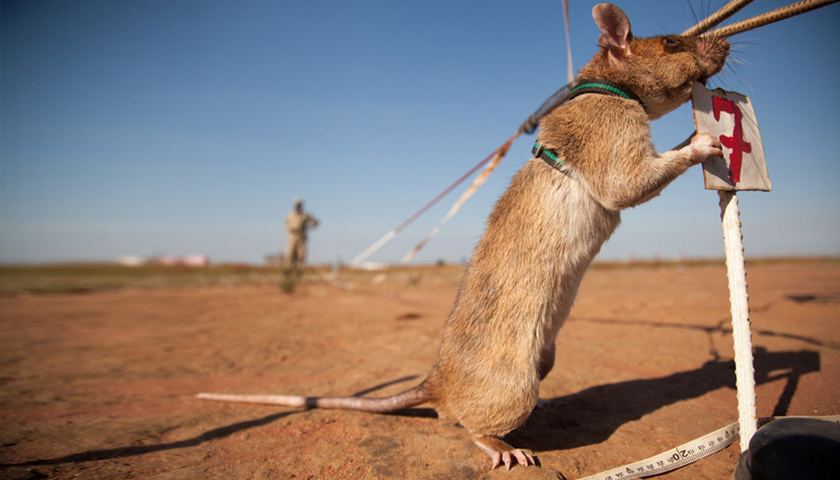APOPO, the charity famed for its use of specially trained rats in landmine and tuberculosis detection, is proud to announce it will begin clearing landmines in Zimbabwe’s largest wildlife conservation area and important elephant migration area, coinciding with new beginnings in the country.
APOPO has been tasked by the Zimbabwean Ministry of Defence with clearing the deadly landmines inside what is now the Great Limpopo Transfrontier Park (GLTP) – the largest conservation area in the world, spanning South Africa, Mozambique and Zimbabwe. The four-decades old landmines cause a serious threat to already endangered wildlife such as elephants and lions, as well as to local communities who desperately need the land for grazing and agriculture.
Laid along the Mozambique border by the Rhodesian army during the war of independence in the 1970s, the landmines represent a remnant of a troubled time.
“Robert Mugabe’s resignation after four decades of rule now marks the beginning of a new era for Zimbabwe,” said Christophe Cox, CEO of APOPO. “It is time to move forward and remove these dangerous explosives from the country.”
APOPO has been tasked by the Zimbabwean Ministry of Defence with clearing the deadly landmines inside what is now the Great Limpopo Transfrontier Park (GLTP) – the largest conservation area in the world, spanning South Africa, Mozambique and Zimbabwe. The four-decades old landmines cause a serious threat to already endangered wildlife such as elephants and lions, as well as to local communities who desperately need the land for grazing and agriculture.
Landmines and wildlife do not mix. Animals can wander into mined areas, triggering explosives that result in the loss of a limb followed by a slow, painful death. The minefield has one of the highest landmine densities in the world—about 5,500 mines per kilometer—making any movement in the region treacherous. Home to thousands of elephants, studies suggest that this huge lethal barrier is preventing traffic across the divide and may have a long-term impact on the gene pool of species.
Meanwhile communities that live in proximity of the minefield have suffered four decades of fear and terror, unable to safely access vital resources such as water, much needed grazing lands, and cross-border trading routes. Many human lives and limbs have been lost and injury to livestock still occurs regularly.
Clearing the landmines will also open new economic opportunities for the region as safari operators and lucrative, conservation-focused ecotourism will be able to operate for the first time. Kruger National Park in neighboring South Africa receives over 1.5 million tourists a year, which could potentially travel up the Sengwe Corridor and into Gonarezhou National Park without requiring a visa or leaving the conservation area. Currently Gonarezhou National Park receives virtually no international tourists.
“We are proud to be able to help Zimbabwe rid itself of these mines during an incredibly important period in the nation’s history,” Cox said. “We saw this approach work in Mozambique, which is now mine-free, and believe we can help accomplish the same in Zimbabwe.”
APOPO will begin the project using conventional demining methods (survey, metal detectors and machines) and aim to bring in the mine detection rats at a later stage after government approval.
APOPO Zimbabwe is partnered by the Zimbabwean Ministry of Defence and sponsored by the Players of the Postcode Lottery UK and the Nationale Postcode Loterij.
